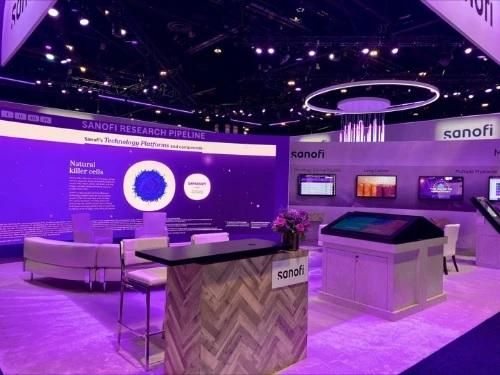Science and Sanofi: ASCO 2023 Takeaways

By Emily Morris, Head of U.S. Oncology
The American Society for Clinical Oncology (ASCO) annual meeting is something I look forward to each year because it allows me the opportunity to connect with oncology experts, patient advocacy groups, payers and access organizations, academic collaborators, and other industry partners. As the Head of U.S. Oncology at Sanofi, I have the privilege of leading a team committed to chasing the miracles of science. Motivated by our common goal, we’re driving the evolution of cancer treatment, working to transform patient care, and impacting the lives of people living with cancer. We know that innovation can’t happen in a vacuum, and we understand the importance of embracing our strategic partnerships and collaborations to help us align science and technology with ever evolving patient needs.
This year at ASCO, Sanofi presented a first-in-human study of our investigational natural killer (NK) cell engager designed to target myeloid leukemia cells. This work highlights Sanofi’s focus on identifying selective targets for cancer treatment along with cellular therapy approaches. Our robust oncology pipeline demonstrates that we are making progress on our mission to help address gaps in oncology treatment, with the hope of transforming what’s possible for people living with cancer. Although these are early investigational findings, this exemplifies Sanofi’s commitment to researching potential innovative medicines with unique mechanisms of action.

The Sanofi booth at ASCO
In addition to our science, elevating patients’ voices in everything we do has never been more critical. I had the opportunity to sit on a panel during our patient advocacy breakfast and participate in meetings with patient advocacy groups to better understand the needs of the cancer patients and caregivers we serve. One of my key learnings from patient-focused data presentation is that many new potential biomarker driven therapies are at the forefront of innovation, but molecular testing is a necessary diagnostic tool for access to these therapies. While overall rates of molecular testing are increasing, patients who are historically underserved or economically disadvantaged are not frequently offered this testing, furthering disparities in cancer care for these patient populations. This data not only highlights the importance of equitable access to diagnostic testing for all patients but also underscores the work that needs to be done across the healthcare industry to remove these barriers to care.
At Sanofi, our purpose motivates us to continue advancing science and developing potentially transformative therapies on behalf of all people living with cancer – this is an exciting time to be involved in the development of potential new oncology therapeutics. The innovative technology platforms and differentiated treatment combinations currently under investigation have the potential to change lives by addressing unmet needs in the cancer community.